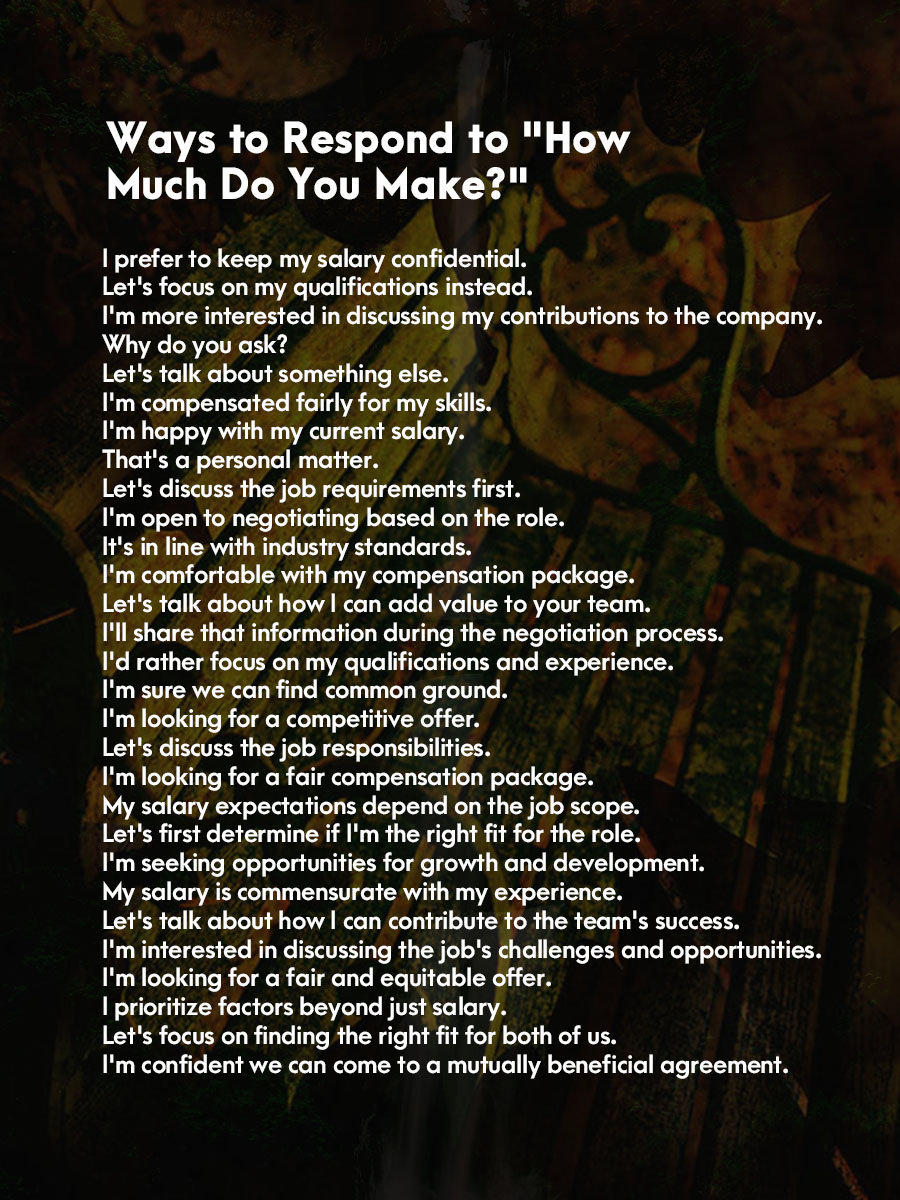When someone asks, “How much do you make?” it can feel uncomfortable. But don’t worry, there are ways to handle it with grace and confidence. In this article, we’ll explore different responses to this tricky question. First, we’ll discuss the importance of setting boundaries and why you don’t always have to answer directly.
Then, we’ll delve into strategies like deflecting the question politely or offering a range instead of a specific number. Additionally, we’ll touch on the benefits of turning the conversation toward your skills and qualifications. By the end, you’ll feel more prepared to navigate this common inquiry with tact and professionalism.

35 Ways to Respond to “How Much Do You Make?”
- I prefer to keep my salary confidential.
- Let’s focus on my qualifications instead.
- I’m more interested in discussing my contributions to the company.
- Why do you ask?
- Let’s talk about something else.
- I’m compensated fairly for my skills.
- I’m happy with my current salary.
- That’s a personal matter.
- Let’s discuss the job requirements first.
- I’m open to negotiating based on the role.
- It’s in line with industry standards.
- I’m comfortable with my compensation package.
- Let’s talk about how I can add value to your team.
- I’ll share that information during the negotiation process.
- I’d rather focus on my qualifications and experience.
- I’m sure we can find common ground.
- I’m looking for a competitive offer.
- Let’s discuss the job responsibilities.
- I’m looking for a fair compensation package.
- My salary expectations depend on the job scope.
- Let’s first determine if I’m the right fit for the role.
- I’m seeking opportunities for growth and development.
- My salary is commensurate with my experience.
- Let’s talk about how I can contribute to the team’s success.
- I’m interested in discussing the job’s challenges and opportunities.
- I’m looking for a fair and equitable offer.
- I prioritize factors beyond just salary.
- Let’s focus on finding the right fit for both of us.
- I’m confident we can come to a mutually beneficial agreement.
- I prefer to discuss compensation during the interview process.
- I’m looking for a competitive compensation package.
- Let’s first discuss the job requirements and expectations.
- I’m seeking opportunities for advancement and growth.
- I’m open to discussing compensation once we determine mutual interest.
- Let’s focus on how I can contribute to the team’s success instead.
Strategies For Responding
Deflecting The Question
When faced with the question, “How much do you make?” it’s common to feel uncomfortable. Deflecting the question can be a strategic way to handle the situation. You can shift the conversation in a different direction, perhaps by saying, “I’m more focused on finding the right opportunity and assessing the overall value of the role.”
Providing A Range
Another approach is to provide a range instead of stating a specific figure. You can say, “I’m looking for a compensation package in the range of $X to $Y based on my experience and the value I can bring to the role.” This approach can give a general idea without disclosing your exact salary.
Discussing Expectations
Directly discussing your expectations can also be effective. For instance, you might respond with, “I’m seeking a salary that reflects the market value for someone with my skills and experience. Can you share the salary range for this position?” This tactic allows you to gain insight into the potential salary for the role.
Shifting Focus To Skills And Value
You can also shift the focus to your skills and value. Instead of revealing your current salary, emphasize what you can bring to the role. You could say, “I aim to contribute my expertise in (specific skill/area) and add value through (specific action/project). I believe my abilities are worth considering beyond just the monetary aspect.”
Cultural And Industry Factors
Navigating questions about your income involves considering cultural and industry norms. Respond tactfully by focusing on your value and skill set to steer the conversation positively. Maintaining professionalism while highlighting achievements can help in such situations.
Considering Cultural Norms
When it comes to discussing personal finances, cultural norms play a significant role in shaping our responses to questions like “How much do you make?” Different cultures have diverse customs and beliefs surrounding money, which influence how individuals perceive discussing their salary.
In many cultures, openly discussing personal finances is considered taboo. Talking about money may be seen as boastful or uncouth, while others may believe it is a private matter that should not be disclosed. However, in some cultures, sharing salary information is encouraged, as it promotes transparency and equality.
It is crucial to respect cultural norms when responding to questions about your earnings. Consider the following strategies to navigate this sensitive topic:
- Focus on the purpose: Instead of providing a specific figure, discuss the purpose of the question. For example, you may say, “I appreciate your interest, but I prefer to focus on the value I bring to my work rather than the exact amount I make.”
- Deflect politely: Politely shifting the conversation away from your income can help to maintain privacy and avoid discomfort. You could respond with, “I’m more interested in discussing the project at hand than discussing personal finances.”
Impact Of Industry Standards
Aside from cultural norms, industry standards also play a significant role in how individuals respond to inquiries about their income. Different professions have varying expectations regarding salary transparency, which can influence your approach to answering questions about your earnings.
In some industries, salary transparency is encouraged and openly discussed. Companies may even have policies in place that promote transparency among employees. In these cases, sharing salary information might be seen as a way to advocate for fair pay and equality within the workplace.
On the other hand, certain industries are known to be more secretive about salaries. This might be due to competitive factors or the perception that discussing income undermines workplace harmony. In such cases, it may be appropriate to politely decline to answer the question, stating that you prefer to keep salary information confidential.
Regardless of the industry, it is essential to assess the prevailing standards and norms before responding to questions about your income.
Legal And Ethical Considerations
When confronted with the question, “How much do you make?” it is important to approach the situation with an understanding of the legal and ethical considerations. This subheading explores two key areas to consider: Understanding Privacy Laws and Addressing Equal Pay Issues.
Understanding Privacy Laws
In the workplace, it is crucial to respect the privacy of individuals when discussing salary information. Privacy laws are in place to protect employees from their salary details being shared without their consent. By divulging your salary information to others, you may be violating these laws and potentially subjecting yourself to legal consequences.
To ensure compliance with privacy laws:
- Do not disclose your salary: Avoid sharing specific salary figures with others unless required by law or company policy.
- Respect confidentiality: Keep salary discussions confidential and do not share someone else’s salary information without their express permission.
Addressing Equal Pay Issues
Another important consideration when responding to questions about your salary is addressing potential equal pay issues. Equal pay is a fundamental right, and it is essential to address any inequalities in compensation based on gender, race, or any other protected characteristic. By openly discussing salary, we can help identify and rectify pay disparities that may exist.
Here are some tips for addressing equal pay issues:
- Research average salaries: Before discussing your salary, gather information on average salaries for similar roles in your industry to be better informed.
- Emphasize job performance: Focus on your accomplishments, skills, and job performance rather than solely discussing your salary.
- Encourage transparency: Advocate for transparent pay practices within your organization, and support efforts to address any unequal pay gaps.
By understanding privacy laws and addressing equal pay issues, you can navigate the question of “How much do you make?” with a respectful and informed approach. Remember, it is essential to prioritize privacy, advocate for equal pay, and contribute to a fair and transparent work environment.
Preparation And Practice
When faced with the question, “How much do you make?” it’s crucial to be prepared. Preparation and practice play a significant role in how you respond to this sensitive query.
Role-playing Scenarios
One effective way to prepare for this question is by role-playing various scenarios. Enlist a friend or family member to act as the interviewer, simulating the potentially uncomfortable situation.
Crafting Your Response
Crafting a polished response requires careful consideration and forethought. Ensure your reply is both professional and tactful, without being evasive or confrontational.

Conclusion
So, next time you face the “How much do you make? ” Question, you have a variety of responses at your disposal. It’s important to remember that your salary is private, and you have the right to withhold that information.
By approaching the situation with confidence and grace, you can navigate this question tactfully and maintain your professionalism. Keep in mind that the best response is one that aligns with your personal boundaries and values.









